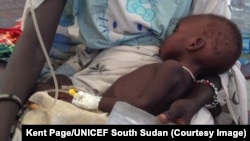Cholera can now be prevented effectively with a low-cost oral vaccine.
A report published July 8 in The Lancet said the first trial of an oral cholera vaccine was successful and could speed up global efforts against the disease.
The trial took place in an overcrowded slum in Dhaka, Bangladesh, where cholera is endemic. The vaccine, Shanchol, was given as part of routine health services to both adults and children and was found to protect against severe cases of cholera.
The study shows that even with moderate vaccination coverage, cases of severe, life-threatening cholera were reduced by nearly 40 percent among those vaccinated, which included children age 5 and under.
The nearly 270,000 participants were divided into three groups: One received the oral cholera vaccine, another got the vaccine plus instructions on hand-washing and clean drinking water, and the third received no intervention.
Those who got the vaccine received two doses two weeks apart. Researchers found the vaccine reduced the incidence of severe cholera by 37 percent after two years — and by 45 percent in the group that had clean water and instructions in hand washing.
Lead author Dr. Firdausi Qadri said the "findings show that a routine oral cholera vaccination program in cholera-endemic countries could substantially reduce the burden of disease and greatly contribute to cholera control efforts." She added that the vaccine is cheap, with two doses costing $3.70 US, about a third of the price of Dukoral, the other licensed vaccine. But even though Shanchol is relatively cheap, it is still expensive for the very poor.
Qadri is director of the Centre for Vaccine Sciences at the International Centre for Diarrhoeal Disease Research Bangladesh in Dhaka. She agreed with two reviewers, Maureen O'Leary and and Kim Mulholland from the London School of Hygiene & Tropical Medicine, in that a vaccine is only part of a larger program to control cholera and that the real key is access to clean water and proper sanitation.
However, Qadri said these basic needs remain "a rather difficult reality for the world’s poorest nations as well as those affected by climate change, war and natural disasters.” She also noted that half the developing world, some 2.5 billion people, lack access to these basic health needs.
The reviewing scientists said that those who received the vaccine have to be monitored to see how long the protection lasts and when booster doses should be given.
Shanchol is manufactured by Shantha, a biotech company in India that is part of Sanofi, a French multinational pharmaceutical company.




